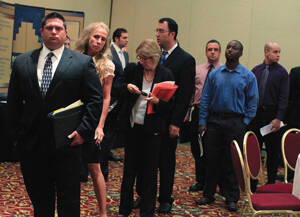The U.S. Conference of Catholic Bishops called the nation’s persistently high numbers of unemployed, just under 13 million in July, a “moral failure” in its annual Labor Day statement. Noting the millions out of work or underemployed and the millions more who have relinquished hope of finding a job, the bishops wrote, “The sad fact is that over 46 million people live in poverty, and, most disturbingly, over 16 million children grow up poor in our nation.”
Released on Aug. 13, the statement, “Placing Work and Workers at the Center of Economic Life,” scolded political candidates and elected officials, noting that their “relative silence...on the moral imperative to resist and overcome poverty is both ominous and disheartening.”
“The depth of poverty in the U.S. is really shocking and probably the worst it has been in my adult life,” said Sharon Daly, former director of the Domestic Social Development Office at the U.S.C.C.B. “I think it’s wonderful that the bishops’ statement calls attention to this and links it to lack of jobs—decent jobs with wages that can support a family and offer benefits—because that is the single most important factor. It points out that the economy should be designed and judged by its impact on working and poor people, as well as the common good.”
The bishops singled out the “unique and essential responsibility” of labor unions in economic renewal and noted their indispensable role as agents of solidarity and subsidiarity, but warned that “some union actions can contribute to excessive polarization and intense partisanship, can pursue positions that conflict with the common good, or can focus on just narrow self-interests.”
Daly said she was surprised that labor unions were the only social institution called to account by the bishops. “It’s not the teachers’ union or the firefighter or police unions that have caused this incredible economic crash worldwide,” she said. “If the bishops’ statement is going to single out unions as contributing to the problem, it’s very unfair if they don’t also mention mortgage companies, investment bankers and broker-dealers.” These groups, Daly pointed out, committed fraud and abuse and contributed to the bankruptcy of cities and towns that invested pension plans with such firms. “The bishops complain of unions pursuing narrow self interest and ignoring the common good,” she said, “but none of these other major organizations are working toward” the common good.
Daly said that the church ought to reach out to the labor movements and ask them what they think could be done for workers. “In some places the church has resisted union efforts, so sometimes the relationship is strained,” she said. “But what Catholic teaching says we should do is reach out to those who are struggling and see what we can do together.”
Alex Mikulich, a research fellow at the Jesuit Social Research Institute at Loyola University, New Orleans, agreed that the bishops’ statement is, at its core, a positive document. “It rightly calls for the establishment of economic justice and ending barriers to employment and a living wage,” he said. “It rightly calls both dominant national political parties to address workers’ rights, joblessness and poverty.”
But “the document largely lacks significant practical challenge to lay Catholics to pay a price for economic and racial justice,” he said.








